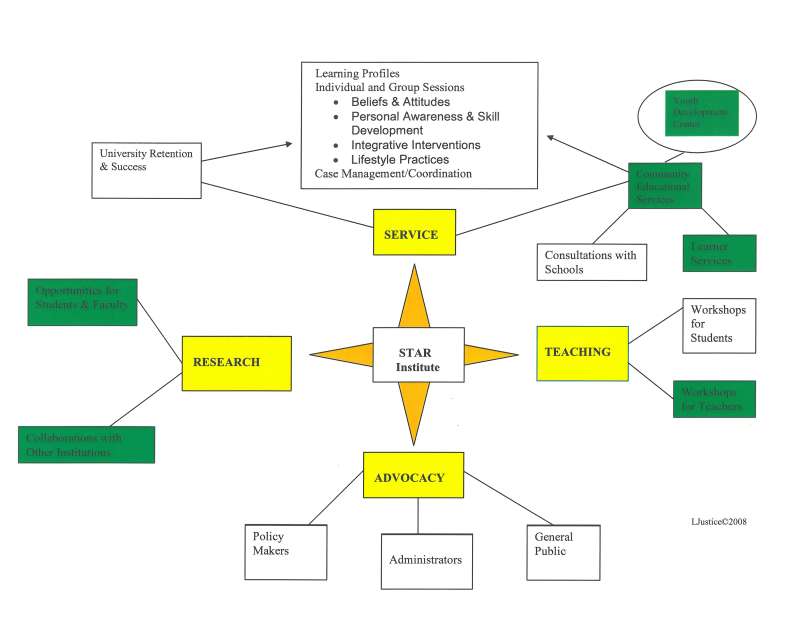|
|
|||
| |||
Service, Teaching, Advocacy, and Research
The mission of The STAR Institute is to help children, youth, and adults to optimize their learning capabilities using an interdisciplinary and multifaceted approach that will foster collaborative relationships involving communities and institutions of higher learning in Northeast Ohio. For further information on STARCHILD, contact us at LoveLight@lovelightcares.org.
Specific proposed activities are described under the four major components of the Institute: service, teaching, advocacy, and research. It is anticipated that The STAR Institute will contribute to:
- productivity, academic improvement, and quality of life for individuals receiving services;
- college retention rates;
- expanded educational opportunities for pre- and in-service teachers;
- the existing knowledge base related to human learning and development;
- increased collaboration among colleges and universities in northeastern Ohio;
- recruitment of graduate students interested in human learning and development;
- academic improvement among students in P-12 schools involved with the Institute;
- education of parents regarding ways to support the natural development of their children; and
- economic well-being of the northeastern Ohio region and beyond.
Service
The vision is that the service component of the Institute will include direct services to students attending Kent State University and other universities as well as residents of the community; and consultations with schools regarding ways to increase academic success via learner readiness and development. We anticipate that the service component will consist of the following elements.
- Establish a model lifelong learning center, which will include a licensed child development center providing child care as well as educational/developmental services for participants and families; an after-school program for school-age children, and teen entrepreneurial education and empowerment projects.
- Consult with P-12 schools regarding policies and practices related to academic success of their students and work with individuals or groups of students to improve performance and general well-being.
- Provide help for struggling students in the community via removal of barriers to learning and development of attitudes, beliefs, skills, and practices that will promote their success. An added benefit is the opportunity for Kent State and other college-level students to gain valuable experience related to their major courses by working with these younger students.
Guided by the principles of the Schools Attuned approach developed by Dr. Mel Levine, the work of the Institute will focus on embracing neurodevelopmental diversity, “strengthening strengths”, and identifying and overcoming underlying causes of academic underachievement. The developmental status of the learner will be considered along with conditions that may be influencing his or her ability to function effectively. The student will be encouraged to take ownership of his/her learning and to be actively engaged in the process as a partner and decision-maker. In collaboration with the student and other interested parties, information will be gathered regarding the student’s performance from a variety of sources, including interviews, student work samples, questionnaires, observations of the student, self profiles completed by the student, and a computer-adaptive assessment, Measures of Academic Progress (MAP), created by the Northwest Evaluation Association (NWEA).
A learning profile will then be created; and a management/goals plan will be developed, implemented, and revised as needed. The plan will incorporate several non-traditional approaches as appropriate. As part of the management plan, the student will participate in activities at the Institute and at home, according to his or her individual needs. Such activities may include any or all of the following: kinesthetic, visual, auditory, language, and mental exercises; stress reduction and practical optimism sessions; discussions and skill-building sessions with Center staff; and projects designed to enhance existing strengths and interests while increasing self-confidence and self-efficacy as well as developing new skills and efficiencies. Throughout the process, communication will be encouraged among the various stakeholders, in order to support and monitor the student’s progress.
Teaching
Workshops will be offered on topics such as stress reduction, building self-efficacy, and learning to learn, for students who could benefit from participation in these, but who do not need as intensive a program as the students participating in the service component.
These workshops will also be available to pre-service teachers who may be interested in learning material and techniques that may be useful in their future careers. Some workshops on learning and human development may also be offered for graduate students and faculty, in conjunction with other entities on campus. In addition, P-12 educators will have the opportunity to attend workshops designed to assist them in the classroom and in preschool centers.
Research
External grants will be sought to conduct research on topics related to human learning, integration, and development, thus adding to the knowledge base in educational psychology and other fields. In addition, students will be provided with opportunities to gain experience in carrying out research and related activities and faculty will be able to pursue research interests and share findings via publication and presentations. Institutions of higher education will be invited to participate in collaborative research ventures involving their faculty and students, and partnerships will be encouraged with schools and non-profit organizations in various communities within Ohio and beyond.
Advocacy
As the Institute becomes more established and its reputation grows, the STAR Institute may extend its influence by communicating with policy makers at various governmental levels, education administrators, and the general public through meetings, presentations, newspaper columns, public testimony, magazine and journal articles, and position papers. The subject of these communications will be sound practices related to the healthful development and academic success of children, adolescents, and adults.

